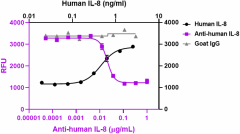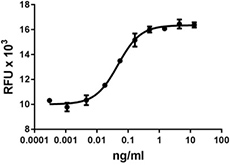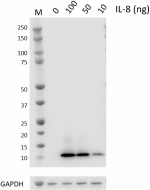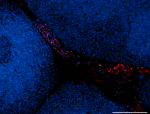- Clone
- Poly5424 (See other available formats)
- Regulatory Status
- RUO
- Other Names
- Small inducible cytokine subfamily B, member 8 (SCYB8), Monocyte derived neutrophils chemotactic factor (MDNCF), Neutrophil-activating peptide 1 (NAP1), Granulocyte chemotactic protein 1 (GCP1), Chemochine, CXC motif, ligand 8, CXCL8
- Isotype
- Goat Polyclonal IgG
- Ave. Rating
- Submit a Review
- Product Citations
- publications

-

Recombinant human IL-8 (Cat. No. 574202) (black circles) induces the chemotaxis of mouse Baf3-mCXCR2 transfectant chemoattractant cells. LEAF™ purified anti-human IL-8 antibody (clone Poly5424) (purple squares) neutralizes the recombinant human IL-8 (Cat. No. 574202)-induced chemotaxis on mouse Baf3-mCXCR2 transfectant chemoattractant cells in a dose-dependent manner, whereas the LEAF™ purified goat polyclonal IgG isotype control (gray triangles) does not have the effect. ND50 range: 7 - 35 ng/mL. -

Whole cell extracts (15 µg total protein) from HeLa cells spiked with the indicated amount of recombinant human IL-8 (Cat. No. 570909) were resolved by 4-12% Bis-Tris gel electrophoresis, transferred to a PVDF membrane, and probed with 1.0 µg/mL purified anti-IL-8 antibody (clone Poly5424) overnight at 4°C. Proteins were visualized by chemiluminescence detection using HRP donkey anti-goat IgG antibody at a 1:10000 dilution. Direct-Blot™ HRP anti-GAPDH antibody (Cat. No. 607904) was used as a loading control at a 1:25000 dilution (lower). Lane M: Molecular weight marker -

IHC staining using purified anti-IL-8 antibody (Poly5424) on formalin-fixed paraffin-embedded human tonsil tissue. The tissue was incubated with 5 µg/mL of the primary antibody overnight at 4°C, followed by incubation with 2.5 µg/mL of Alexa Fluor® 647 donkey anti-goat IgG (red) for one hour at room temperature. Nuclei were counterstained with DAPI (blue), and the slide was mounted with ProLong™ Gold Antifade Mountant. The image was captured with a 10X objective. Scale bar :100 µm.
| Cat # | Size | Price | Quantity Check Availability | Save | ||
|---|---|---|---|---|---|---|
| 542403 | 100 µg | £254 | ||||
IL-8 (CXCL8) was originally recognized as a neutrophil-activating protein on the basis of two in vitro effects, chemotaxis and the release of granule enzymes. IL-8 is generated as a precursor of 99 amino acids. Once the mature cytokine is secreted, the amino-terminal is processed to yield several biologically active variants. The predominant variant consists of 72 amino acids. IL-8 is one of the ELR (Glu-Leu-Arg) motif-positive CXC-chemokines and shares similarities with angiogenic cytokines.
Product DetailsProduct Details
- Verified Reactivity
- Human
- Antibody Type
- Polyclonal
- Host Species
- Goat
- Immunogen
- Recombinant human IL-8
- Formulation
- 0.2 µm filtered in phosphate-buffered solution, pH 7.2, containing no preservative.
- Endotoxin Level
- Less than 0.1 EU/µg of the protein (< 0.01 ng/µg of the protein) as determined by the LAL test.
- Preparation
- The LEAF™ (Low Endotoxin, Azide-Free) antibody was purified by affinity chromatography.
- Concentration
- The antibody is bottled at the concentration indicated on the vial. To obtain lot-specific concentration and expiration, please enter the lot number in our Certificate of Analysis online tool.
- Storage & Handling
- Upon receipt, store frozen at -20°C. Make small volume aliquots if needed and avoid repeated freeze-thaw cycles to prevent denaturing the antibody.
- Application
-
Neut - Quality tested
WB, IHC-P - Verified - Recommended Usage
-
Each lot of this antibody is quality control tested by neutralizing the chemotaxis induced by recombinant human IL-8 (Cat. No. 574202) on mouse Baf3-mCXCR2 transfectant chemoattractant cells. ND50 range: 7 - 35 ng/mL. For western blotting, the suggested use of this reagent is 0.2 - 1.0 µg/mL. For immunohistochemistry on formalin-fixed paraffin-embedded tissue sections, a concentration range of 2.5 - 5.0 µg/mL is suggested. It is recommended that the reagent be titrated for optimal performance for each application.
- RRID
-
AB_2904435 (BioLegend Cat. No. 542403)
Antigen Details
- Structure
- Chemokine
- Distribution
-
IL-8 is expressed by neutrophils, mococytes, macrophages, mast cells, endothelial cells, fibroblasts, keratinocytes, synovial cells, chondrocytes, epithelial cells, megakariocytes, melanocytes, hepatocytes, mesangial, and tumor cells. Most primary and metastatic solid tumors, such as breast, uterine, prostate, colon, and pancreatic carcinomas, melanoma, and glioblastoma, constitutively express IL-8.
- Function
- CXCL8 has diverse functions in immune surveillance, inflammation, and angiogenesis. CXCL8 directly modulates endothelial cell proliferation and migration, thus promoting angiogenesis. IL-8 modulates myelopoiesis by suppressing the myeloid progenitor proliferation. IL-8 also modulates the homing of hematopoitic progenitors by affecting the secretion of MMPs and TIMPs from bone marrow and peripheral blood CD34+ cells. Monocytes and macrophages generate IL-8 upon stimulation with IL-1α, IL-1β, TNFα, IL-3, GMCSF, endotoxin, lectins, phorbol esters, immune complexes, and phagocytosis. Opsonized particles are also a prime stimulus for IL-8 production by neutrophils.
- Interaction
- Neutrophils, basofils, highly cytotoxic CD8 T cells, megakariocytes, endothelial cells
- Ligand/Receptor
- CXCR1 (CDw128a) and CXCR2
- Cell Type
- Neutrophils
- Biology Area
- Cell Biology, Immunology, Neuroinflammation, Neuroscience
- Molecular Family
- Cytokines/Chemokines
- Antigen References
-
- Hess C, et al. 2004. Blood. 104:3463-71.
- Emadi S, et al. 2005. Blood. 105:464-73.
- Matsuo Y, et al. 2009. Int J Cancer. 4:853-61.
- Drewniak A, et al. 2010. Blood. 115:4588-96.
- Gene ID
- 3576 View all products for this Gene ID
- UniProt
- View information about IL-8 on UniProt.org
Related FAQs
- Do you guarantee that your antibodies are totally pathogen free?
-
BioLegend does not test for pathogens in-house aside from the GoInVivo™ product line. However, upon request, this can be tested on a custom basis with an outside, independent laboratory.
- Does BioLegend test each Ultra-LEAF™ antibody by functional assay?
-
No, BioLegend does not test Ultra-LEAF™ antibodies by functional assays unless otherwise indicated. Due to the possible complexities and variations of uses of biofunctional antibodies in different assays and because of the large product portfolio, BioLegend does not currently perform functional assays as a routine QC for the antibodies. However, we do provide references in which the antibodies were used for functional assays and we do perform QC to verify the specificity and quality of the antibody based on our strict specification criteria.
- Does BioLegend test each Ultra-LEAF™ antibody for potential pathogens?
-
No, BioLegend does not test for pathogens in-house unless otherwise indicated. However, we can recommend an outside vendor to perform this testing as needed.
- Have you tested this Ultra-LEAF™ antibody for in vivo or in vitro applications?
-
We don't test our antibodies for in vivo or in vitro applications unless otherwise indicated. Depending on the product, the TDS may describe literature supporting usage of a particular product for bioassay. It may be best to further consult the literature to find clone specific information.
Other Formats
View All IL-8 Reagents Request Custom Conjugation| Description | Clone | Applications |
|---|---|---|
| LEAF™ Purified anti-human IL-8 | Poly5424 | Neut,WB,IHC-P |
Customers Also Purchased
Compare Data Across All Formats
This data display is provided for general comparisons between formats.
Your actual data may vary due to variations in samples, target cells, instruments and their settings, staining conditions, and other factors.
If you need assistance with selecting the best format contact our expert technical support team.
 Login / Register
Login / Register 

















Follow Us